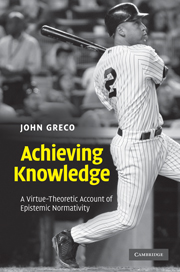7 - Knowledge and context
Published online by Cambridge University Press: 05 June 2012
Summary
I begin by making two clarifications regarding the topic of this chapter. First, a number of positions in epistemology go by the name “contextualism.” One important kind of contextualism is “attributor contextualism,” or the thesis that the truth-value of a knowledge claim can vary across attributor contexts. Put differently: the truth-value of a knowledge claim is relative to the context of attribution. Understood this way, contextualism is a semantic thesis about the word “knows” and related language, rather than a thesis about how one ought to respond to some traditional epistemological problem, such as the problem of skepticism. Here my primary concern is with contextualism as a semantic thesis. Contextualism in epistemology first gained interest as a response to skepticism and then to other traditional problems in epistemology. Nevertheless, questions about the semantics of epistemological discourse have become interesting in their own right, and in any case serve as a preliminary for the application of semantics to traditional problems.
Second, I will be addressing contextualism in moral theory as well as contextualism in epistemology. In particular, I want to explore some moral analogues of attributor contextualism in epistemology. In Part One of the chapter I try to clarify what attributor contextualism is and what its moral analogues look like. In Part Two I address two worries that might be raised about contextualism in epistemology and that carry over to its moral analogues: that contextualism robs epistemology (and moral theory) of a proper subject matter, and that contextualism robs knowledge claims (and moral claims) of their objectivity.
- Type
- Chapter
- Information
- Achieving KnowledgeA Virtue-Theoretic Account of Epistemic Normativity, pp. 102 - 124Publisher: Cambridge University PressPrint publication year: 2010



